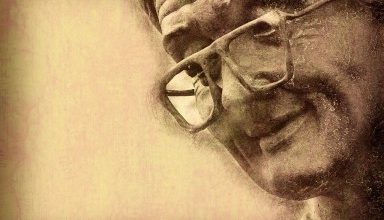
The Widow’s Might
– Charlotte Perkins Gilman
JAMES HAD come on to the funeral, but his wife had not; she could not leave the children—that is what he said. She said, privately, to him, that she would not go. She never was willing to leave New York except for Europe or for summer vacations; and a trip to Denver in November—to attend a funeral—was not a possibility to her mind.
Looking for a Summary and Analysis of The Widow’s Might? Click on the link below :
Summary and Analysis of The Widow’s Might
Ellen and Adelaide were both there: they felt it a duty—but neither of their husbands had come. Mr. Jennings could not leave his classes in Cambridge, and Mr. Oswald could not leave his business in Pittsburgh—that is what they said.
The last services were over. They had had a cold, melancholy lunch and were all to take the night train home again. Meanwhile, the lawyer was coming at four to read the will.
“It is only a formality. There can’t be much left,” said James.
“No,” agreed Adelaide, “I suppose not.”
“A long illness eats up everything,” said Ellen, and sighed. Her husband had come to Colorado for his lungs years before and was still delicate.
“Well,” said James rather abruptly, “what are we going to do with Mother?”
“Why, of course—” Ellen began, “we could take her. It would depend a good deal on how m
uch property there is—I mean, on where she’d want to go. Edward’s salary is more than needed now.” Ellen’s mental processes seemed a little mixed.
“She can come to me if she prefers, of course,” said Adelaide. “But I don’t think it would be very pleasant for her. Mother never did like Pittsburgh.”
James looked from one to the other.
“Let me see—how old is Mother?”
“Oh she’s all of fifty,” answered Ellen, “and much broken, I think. It’s been a long strain, you know.” She turned plaintively to her brother. “I should think you could make her more comfortable than either of us, James—with your big house.”
“I think a woman is always happier living with a son than with a daughter’s husband,” said Adelaide. “I’ve always thought so.”
“That is often true,” her brother admitted. “But it depends.” He stopped, and the sisters exchanged glances. They knew upon what it depended.
“Perhaps if she stayed with me, you could—help some,” suggested Ellen.
“Of course, of course, I could do that,” he agreed with evident relief. “She might visit between you—take turns—and I could pay her board. About how much ought it to amount to? We might as well arrange everything now.”
“Things cost awfully in these days,” Ellen said with a crisscross of fine wrinkles on her pale forehead. “But of course it would be only just what it costs. I shouldn’t want to make anything.”
“It’s work and care, Ellen, and you may as well admit it. You need all your strength—with those sickly children and Edward on your hands. When she comes to me, there need be no expense, James, except for clothes. I have room enough and Mr. Oswald will never notice the difference in the house bills—but he does hate to pay out money for clothes.”
“Mother must be provided for properly,” her son declared. “How much ought it to cost—a year—for clothes?”
“You know what your wife’s cost,” suggested Adelaide, with a flicker of a smile about her lips.
“Oh, no,” said Ellen. “That’s no criterion! Maude is in society, you see. Mother wouldn’t dream of having so much.”
James looked at her gratefully. “Board—and clothes—all told; what should you say, Ellen?”
Ellen scrabbled in her small black handbag for a piece of paper, and found none. James handed her an envelope and a fountain pen.
“Food—just plain food materials—costs all of four dollars a week now—for one person,” said she. “And heat—and light—and extra service. I should think six a week would be the least, James. And for clothes and carfare and small expenses—I should say—well, three hundred dollars!”
“That would make over six hundred a year,” said James slowly. “How about Oswald sharing that, Adelaide?”
Adelaide flushed. “I do not think he would be willing, James. Of course, if it were absolutely necessary—”
“He has money enough,” said her brother.
“Yes, but he never seems to have any outside of his business—and he has his own parents to carry now. No—I can give her a home, but that’s all.”
“You see, you’d have none of the care and trouble, James,” said Ellen. “We—the girls—are each willing to have her with us, while perhaps Maude wouldn’t care to, but if you could just pay the money—”
“Maybe there’s some left, after all,” suggested Adelaide. “And this place ought to sell for something.”
“This place” was a piece of rolling land within ten miles of Denver. It had a bit of river bottom, and ran up towards the foothills. From the house the view ran north and south along the precipitous ranks of the “Big Rockies” to westward. To the east lay the vast stretches of sloping plain.
“There ought to be at least six or eight thousand dollars from it, I should say,” he concluded.
“Speaking of clothes,” Adelaide rather irrelevantly suggested, “I see Mother didn’t get any new black. She’s always worn it as long as I can remember.”
“Mother’s a long time,” said Ellen. “I wonder if she wants anything. I’ll go up and see.”
“No,” said Adelaide. “She said she wanted to be let alone—and rest. She said she’d be down by the time Mr. Frankland got here.”
“She’s bearing it pretty well,” Ellen suggested, after a little silence.
“It’s not like a broken heart,” Adelaide explained. “Of course Father meant well—”
“He was a man who always did his duty,” admitted Ellen. “But we none of us—loved him—very much.”
“He is dead and buried,” said James. “We can at least respect his memory.”
“We’ve hardly seen Mother—under that black veil,” Ellen went on. “It must have aged her. This long nursing.”
“She had help toward the last—a man nurse,” said Adelaide.
“Yes, but a long illness is an awful strain—and Mother never was good at nursing. She has surely done her duty,” pursued Ellen.
“And now she’s entitled to a rest,” said James, rising and walking about the room. “I wonder how soon we can close up affairs here—and get rid of this place. There might be enough in it to give her almost a living—properly invested.”
Ellen looked out across the dusty stretches of land.
“How I did hate to live here!” she said.
“So did I,” said Adelaide.
“So did I,” said James.
And they all smiled rather grimly.
“We don’t any of us seem to be very—affectionate, about Mother,” Adelaide presently admitted. “I don’t know why it is—we never were an affectionate family, I guess.”
“Nobody could be affectionate with Father,” Ellen suggested timidly.
“And Mother—poor Mother! She’s had an awful life.”
“Mother has always done her duty,” said James in a determined voice, “and so did Father, as he saw it. Now we’ll do ours.”
“Ah,” exclaimed Ellen, jumping to her feet, “here comes the lawyer. I’ll call Mother.”
She ran quickly upstairs and tapped at her mother’s door.
“Mother, oh Mother,” she cried. “Mr. Frankland’s come.”
“I know it,” came back a voice from within. “Tell him to go ahead and read the will. I know what’s in it. I’ll be down in a few minutes.”
Ellen went slowly back downstairs with the fine crisscross of wrinkles showing on her pale forehead again, and delivered her mother’s message.
The other two glanced at each other hesitatingly, but Mr. Frankland spoke up briskly.
“Quite natural, of course, under the circumstances. Sorry I couldn’t get to the funeral. A case on this morning.”
The will was short. The estate was left to be divided among the children in four equal parts, two to the son and one each to the daughters after the mother’s legal share had been deducted, if she were still living. In such case they were furthermore directed to provide for their mother while she lived. The estate, as described, consisted of the ranch, the large, rambling house on it, with all the furniture, stock, and implements, and some five thousand dollars in mining stocks.
“That is less than I had supposed,” said James.
“This will was made ten years ago,” Mr. Frankland explained. “I have done business for your father since that time. He kept his faculties to the end, and I think that you will find that the property has appreciated. Mrs. McPherson has taken excellent care of the ranch, I understand—and has had some boarders.”
Both the sisters exchanged pained glances.
“There’s an end to all that now,” said James.
At this moment, the door opened and a tall black figure, cloaked and veiled, came into the room.
“I’m glad to hear you say that Mr. McPherson kept his faculties to the last, Mr. Frankland,” said the widow. “It’s true. I didn’t come down to hear that old will. It’s no good now.”
They all turned in their chairs.
“Is there a later will, madam?” inquired the lawyer.
“Not that I know of. Mr. McPherson had no property when he died.”
“No property! My dear lady—four years ago he certainly had some.”
“Yes, but three years and a half ago he gave it all to me. Here are the deeds.”
There they were, in very truth—formal and correct, and quite simple and clear—for deeds. James R. McPherson, Sr., had assuredly given to his wife the whole estate.
“You remember that was the panic year,” she continued. “There was pressure from some of Mr. McPherson’s creditors; he thought it would be safer so.”
“Why—yes,” remarked Mr. Frankland. “I do remember now his advising with me about it. But I thought the step unnecessary.”
James cleared his throat.
“Well, Mother, this does complicate matters a little. We were hoping that we could settle up all the business this afternoon—with Mr. Frankland’s help—and take you back with us.”
“We can’t be spared any longer, you see, Mother,” said Ellen.
“Can’t you deed it back again, Mother,” Adelaide suggested, “to James, or to—all of us, so we can get away?”
“Why should I?”
“Now, Mother,” Ellen put in persuasively, “we know how badly you feel, and you are nervous and tired, but I told you this morning when we came, that we expected to take you back with us. You know you’ve been packing—”
“Yes, I’ve been packing,” replied the voice behind the veil.
“I dare say it was safer—to have the property in your name—technically,” James admitted, “but now I think it would be the simplest way for you to make it over to me in a lump, and I will see that Father’s wishes are carried out to the letter.”
“Your father is dead,” remarked the voice.
“Yes, Mother, we know—we know how you feel,” Ellen ventured.
“I am alive,” said Mrs. McPherson.
“Dear Mother, it’s very trying to talk business to you at such a time.
We all realize it,” Adelaide explained with a touch of asperity. “But we told you we couldn’t stay as soon as we got here.”
“And the business has to be settled,” James added conclusively.
“It is settled.”
“Perhaps Mr. Frankland can make it clear to you,” went on James with forced patience.
“I do not doubt that your mother understands perfectly,” murmured the lawyer. “I have always found her a woman of remarkable intelligence.”
“Thank you, Mr. Frankland. Possibly you may be able to make my children understand that this property—such as it is—is mine now.”
“Why assuredly, assuredly, Mrs. McPherson. We all see that. But we assume, as a matter of course, that you will consider Mr. McPherson’s wishes in regard to the disposition of the estate.”
“I have considered Mr. McPherson’s wishes for thirty years,” she replied. “Now, I’ll consider mine. I have done my duty since the day I married him. It is eleven thousand days—today.” The last with sudden intensity.
“But madam, your children—”
“I have no children, Mr. Frankland. I have two daughters and a son. These three grown persons here, grown up, married, having children of their own—or ought to have—were my children. I did my duty by them, and they did their duty by me—and would yet, no doubt.” The tone changed suddenly. “But they don’t have to. I’m tired of duty.”
The little group of listeners looked up, startled.
“You don’t know how things have been going on here,” the voice went on. “I didn’t trouble you with my affairs. But I’ll tell you now. When your father saw fit to make over the property to me—to save it—and when he knew that he hadn’t many years to live, I took hold of things. I had to have a nurse for your father—and a doctor coming; the house was a sort of hospital, so I made it a little more so. I had half a dozen patients and nurses here—and made money by it. I ran the garden—kept cows—raised my own chickens—worked out-of-doors—slept out-of-doors. I’m a stronger woman today than I ever was in my life!”
She stood up, tall, strong, and straight, and drew a deep breath.
“Your father’s property amounted to about eight thousand dollars when he died,” she continued. “That would be two thousand dollars to James and one thousand dollars to each of the girls. That I’m willing to give you now—each of you—in your own name. But if my daughters will take my advice, they’d better let me send them the yearly income—in cash—to spend as they like. It is good for a woman to have some money of her own.”
“I think you are right, Mother,” said Adelaide.
“Yes indeed,” murmured Ellen.
“Don’t you need it yourself, Mother?” asked James, with a sudden feeling of tenderness for the stiff figure in black.
“No, James, I shall keep the ranch, you see. I have good reliable help. I’ve made two thousand dollars a year—clear—off it so far, and now I’ve rented it for that to a doctor friend of mine—woman doctor.”
“I think you have done remarkably well, Mrs. McPherson—wonderfully well,” said Mr. Frankland.
“And you’ll have an income of two thousand dollars a year,” said Adelaide incredulously.
“You’ll come and live with me, won’t you?” ventured Ellen.
“Thank you, my dear, I will not.”
“You’re more than welcome in my big house,” said Adelaide.
“No thank you, my dear.”
“I don’t doubt Maude will be glad to have you,” James rather hesitatingly offered.
“I do. I doubt it very much. No thank you, my dear.”
“But what are you going to do?”
Ellen seemed genuinely concerned.
“I’m going to do what I never did before. I’m going to live!”
With a firm swift step, the tall figure moved to the windows and pulled up the lowered shades. The brilliant Colorado sunshine poured into the room. She threw off the long black veil.
“That’s borrowed,” she said. “I didn’t want to hurt your feelings at the funeral.”
She unbuttoned the long black cloak and dropped it at her feet, standing there in the full sunlight, a little flushed and smiling, dressed in a well-made traveling suit of dull mixed colors.
“If you want to know my plans, I’ll tell you. I’ve got six thousand dollars of my own. I earned it in three years—off my little rancho-sanitarium. One thousand I have put in the savings bank—to bring me back from anywhere on earth, and to put me in an old lady’s home if it is necessary. Here is an agreement with a cremation company. They’ll import me, if necessary, and have me duly—expurgated—or they don’t get the money. But I’ve got five thousand dollars to play with, and I’m going to play.”
Her daughters looked shocked.
“Why, Mother—”
“At your age—”
James drew down his upper lip and looked like his father.
“I knew you wouldn’t any of you understand,” she continued more quietly. “But it doesn’t matter any more. Thirty years I’ve given you—and your father. Now I’ll have thirty years of my own.”
“Are you—are you sure you’re—well, Mother?” Ellen urged with real anxiety.
Her mother laughed outright.
“Well, really well, never was better, have been doing business up to today—good medical testimony that. No question of my sanity, my dears! I want you to grasp the fact that your mother is a Real Person with some interests of her own and half a lifetime yet. The first twenty didn’t count for much—I was growing up and couldn’t help myself. The last thirty have been—hard. James perhaps realizes that more than you girls, but you all know it. Now, I’m free.”
“Where do you mean to go, Mother?” James asked.
She looked around the little circle with a serene air of decision and replied.
“To New Zealand. I’ve always wanted to go there,” she pursued. “Now I’m going. And to Australia—and Tasmania—and Madagascar—and Tierra del Fuego. I shall be gone some time.”
They separated that night—three going east, one west.





